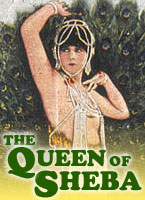
Texts
1 Kings 10.1-13 | 2 Chronicles 9.1-12 | New Testament | Song of Solomon | Psalm 72 | Koran | Collections
Introduction: The central biblical text is 1 Kings 10.1-13. The section from 2 Chronicles is a cut-and-paste job from 1 Kings. The wonderful poetry from the Song of Solomon is almost certainly not addressed to the Queen of Sheba, either in truth or in fancy, despite some traditions that it is. Psalms is extremely passing. Matthew and Luke simply reflect Christian expectations that rightous gentiles—Jonah's converts at Nineveh and the Queen of Sheba—will judge the Jews who rejected Jesus.
1 Kings 10.1-13
The Jewish Publication Society's Tanakh: The Holy Scriptures. .
New American Bible. Footnote assumes it was Yemen.
KJV / Skeptics Annotated Bible. This snarky version of the KJV adds little icons and notes on "inconsistencies," "absurdities," etc. So far, the Queen of Sheba has come out unscathed.[1]
Other texts: New International Version, New Revised Standard Version. Vulgate (Latin), Septuagint (Greek). Does someone want to recommend a Hebrew text? (I don't read Hebrew.)
Commentary on the passages in 1 Kings and Chronicles, from Robert Jamieson's 1873 A commentary, critical and explanatory, on the Old and New Testaments. Jamieson is dainty, noting that Oriental tradition says the Queen received "ample remuneration for the presents she had brought."
Early Jewish Writings: 1 Kings. Links and some representative scholarly blurbs on the book, assembled by Peter Kirby.
"The Woman's Bible," (1898). Julie Smith's 1888 literal translation, with notes by the famous 19c. Feminist Elizabeth Cady Stanton (scroll down to find the Queen of Sheba).
"This is the first account which we have in the Bible of a prolonged rational conversation with a woman on questions of public policy."
2 Chronicles 9.1-12
(Taken from 1 Kings with little change.)
The Jewish Publication Society's Tanakh: The Holy Scriptures.
KJV / Skeptics Annotated Bible. AHA! Kings and Chronicles disagree on how many horse stalls Solomon had. Religious faith tumbles!
New Testament
New American Bible: Matthew 12.42 (with footnote explaining reference), and Luke 11:31.
Song of Solomon, or Song of Songs
Quoting whether the text is "black but" or "black and." One Rev. Durber elsewhere asserts, "It was the Latin of the Vulgate version of the Bible that introduced the but." But what does the Hebrew say?
The Jewish Publication Society's Tanakh: The Holy Scriptures.
"I am black, but comely, O ye daughters of Jerusalem, as the tents of Kedar, as the curtains of Solomon. Look not upon me, that I am swarthy, that the sun hath tanned me…"
New American Bible, "I am as dark-but lovely" (lovely? So palid.)
KJV / Skeptics Annotated Bible. Snarky editors write "Let him kiss me with the kisses of his mouth" is "A fitting beginning for a pornographic poem." Ptooey!
Vulgate nigra sum sed formonsa, "I am black but comely."
Greek Septuagint Melaina eimi kai kale ... me blepsete me, hoti ego eimi memelanomene, "I am black and beautiful ... don't look at me, because I have been blackened."
Other texts: NRSV ("I am black and beautiful"), New International Version ("Dark am I, yet lovely").
Psalm 72
New American Bible: Psalm 72 to Solomon:
"May the kings of Tarshish and the islands bring tribute, the kings of Arabia and Seba offer gifts."
Koran
Collections
KJV: 1 Kings, 2 Chronicles, Matthew and Luke brought together by Karen Elizabeth Ray for Topical Bible Studies.
Notes:
- I despise the project, not so much for poking fun at the Bible, but being so ignorant of it. About half the problems are really problems with the editors' understanding of the passages, of ancient culture, language and so forth. And they seem completely ignorant that most Christians (eg., one billion+ Catholics) do not read the bible the way they and their fundamentalist enemies do. As often happens in these situations, they hate their opponents so much they come to resemble them. (back)
All material © 2000–2005 Tim Spalding (contact)
Books presented in association with Amazon.com.
If you enjoy this site you may like this other site by me:
Mermaids on the Web. Similar site, with over 1,320 pictures .
Angels on the Web. Images and other web resources on angels in Western culture, religion and art.
